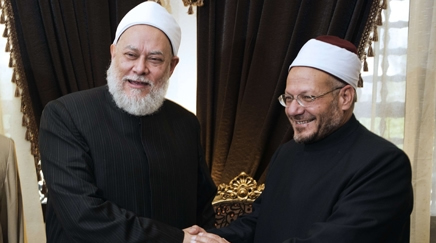In post-Mubarak era Egypt, for the first time the Grand Mufti is elected by Al-Azhar’s Supreme Council and approved by the Egyptian Presidency – Dr Shawqi ‘Allam wins by secret ballot.
Unprecedented in the recent past decades of Egyptian political rule, it is the first time that the Grand Mufti of the Arab Republic of Egypt is elected by the Supreme Council of Senior Scholars of Al-Azhar (Hay’at Kubbar al-‘Ulama’) and the appointment approved by the ruling government headed by President Mohamed Mursi. On 11 February 2013, the Supreme Council, chaired by the Grand Imam Shaykh Dr Ahmad al-Tayyeb Shaykh al-Azhar, met to scrutinise and debate the candidates. This was followed by a secret ballot among the members of the council. The announcement of the outcome was made by the Grand Imam which can be viewed at this link: https://www.youtube.com/watch?v=gDePcQg7e2o. The appointment of Shaykh Dr Shawqi Ibrahim ‘Abd al-Karim ‘Allam as the new Grand Mufti was approved by the Egyptian President on 18 February 2013.
The Grand Imam, Dr Ahmad al-Tayyeb, welcomed the new Grand Mufti, Dr Shawqi ‘Allam, to his new important role in a meeting at the Grand Imam’s office on 5 March 2013 saying, “We welcome you to this important role and wish you success.” Dr Shawqi ‘Allam responded, “I am a son from among the sons of Al-Azhar and will work under the blessings of its shade. Al-Azhar resembles
the authentic religious reference point for the Muslims in the West and the East and it has carried the flag of Islam for fourteen centuries.”
Shaykh Dr Shawqi ‘Allam assumed his new role on 4 March 2013 following the retirement of the notable former Grand Mufti, Shaykh Dr ‘Ali Jumu’ah. Comments of both, the former and the new Grand Mufti, during the ceremony of transfer of the Mufti role held at Dar al-Ifta’ on 3 March 2013 can be watched at this link: https://www.youtube.com/watch?v=ZKX90I1rwa4.
 Dr Shawqi ‘Allam was a lecturer and head of the Department of Islamic Jurisprudence in the Faculty of Jurisprudence and Law at Al-Azhar University’s Tanta Branch. He is a very learned and capable individual and won the election by virtue of his extensive studies, written books, research papers and his practical proficiency in comparative study of criminal law and Islamic legal jurisprudence. No doubt, his calibre and contribution led the Senior Scholars of the Supreme Council of Al-Azhar to vote in his favour.
Dr Shawqi ‘Allam was a lecturer and head of the Department of Islamic Jurisprudence in the Faculty of Jurisprudence and Law at Al-Azhar University’s Tanta Branch. He is a very learned and capable individual and won the election by virtue of his extensive studies, written books, research papers and his practical proficiency in comparative study of criminal law and Islamic legal jurisprudence. No doubt, his calibre and contribution led the Senior Scholars of the Supreme Council of Al-Azhar to vote in his favour.
Dr Shawqi ‘Allam was born on 12 August 1961 and completed his graduate degree in Islamic Jurisprudence and Law from the Tanta Branch of the University of Al-Azhar in 1984. In 1990, he completed his masters in Islamic Jurisprudence from Al-Azhar University in Cairo and then gained his PhD in Islamic Jurisprudence from the same university in 1996 with honours. He then lectured in Oman from 2001 to 2010. Upon his return to Egypt, he lectured and then became head of department at Al-Azhar University’s Tanta Branch.
His lectures, research papers and published books include the following:
- Role of the State regarding the Zakat, 1998.
- Rulings of trade in relation to Khiyar al-Majlis (option to cancel at the time of agreement), 1999.
- A comparative study of Habs al-Madin (detention of the indebted), 2000.
- The role of the Guardian in Marriage, 2001.
- A comparative study of Divorce – Theory and Practice, 2002.
- The Judicial Verdict and its effect on lifting jurisprudential Differences, 2003.
- Judicial Separation between Husband and Wife due to Defects – a comparative study in view of Islamic Jurisprudence and Egyptian Law.
- The Objectives of Sacred Law (Maqasid al-Shari’ah) in light of the two books, al-Musannaf and Qawa’id al-Islam.
- The Ibadi School of Jurisprudence and the Objectives of Sacred Law, 2006.
- Gender Change and Determination between Legitimacy and Prohibition, 2007.
- Woman and Globalisation in the Arabian Peninsula, 2007.
- A study of Political Rights concerning Muslim Women, 2007.
- Legal Maxims and their Role in the Judicial Interpretation of the Contract, when there is Conflict in Words that affect Rights and Obligations within Islamic Law, 2008.
- A study of the Omani Approach in Jurisprudence relating to Contemporary Issues, 2009.
- Lessons in the Jurisprudence of Islamic Worship focusing on ‘Umrah and Hajj, 1997.
- Principles of Islamic Inheritance Law, 1999.
- A concise study of Islamic Legal Maxims, 2004.

